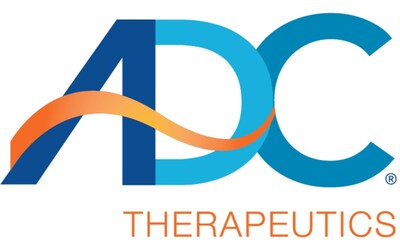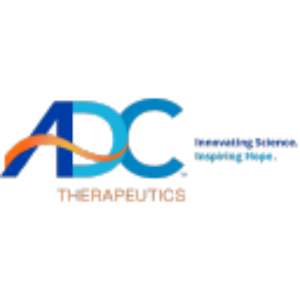ADC Therapeutics Announces Updated Data from LOTIS-7 Clinical Trial Presented at the European Hematology Association 2025 Congress
Rhea-AI Summary
Positive
- High efficacy with 93.3% overall response rate and 86.7% complete response rate in r/r DLBCL patients
- Strong durability of response with 25 of 26 complete responders maintaining their response
- Effective even in CAR-T treated patients with 5 of 6 achieving complete response
- Manageable safety profile with no Grade 5 adverse events
- Trial expansion to 100 patients indicates confidence in treatment potential
Negative
- Treatment-related adverse events led to discontinuation in 6 patients
- Notable occurrence of cytokine release syndrome in both dosing groups
- Presence of Grade 3 or higher adverse events including neutropenia (24.4%) and anemia (9.8%)
News Market Reaction
On the day this news was published, ADCT gained 3.97%, reflecting a moderate positive market reaction.
Data tracked by StockTitan Argus on the day of publication.
ZYNLONTA® in combination with glofitamab (COLUMVI®) in patients with r/r DLBCL demonstrated clinically meaningful benefit with overall response rate (ORR) of
25 of 26 patients achieving CR remained in CR as of the data cut-off
Initial data show the combination is generally well tolerated with a manageable safety profile
Company expanding enrollment for
Company to host conference call today at 8:00 a.m. ET/2:00 p.m. CEST
LAUSANNE,
"The data seen in this study with the combination of ZYNLONTA and glofitamab has shown a manageable safety profile along with strong efficacy data from patients with relapsed or refractory DLBCL, with complete responses observed regardless of prior therapy, including CAR-T," said Mohamed Zaki, MD, PhD, Chief Medical Officer of ADC Therapeutics. "The combination of these two anti-cancer agents holds significant promise for advancing the treatment landscape and addressing unmet need in patients with these hard-to-treat lymphomas."
The presentation highlights updated data as of April 14, 2025, in which r/r LBCL patients received dose levels of 120 µg/kg or 150 µg/kg of ZYNLONTA plus the bispecific antibody glofitamab, with 41 patients evaluable for safety and 30 patients evaluable for efficacy.
Key highlights of the
- Best overall response data among the 30 efficacy evaluable patients shows overall response rate (ORR) of
93.3% (28/30 pts) as assessed by Lugano Criteria - Complete response (CR) rate of
86.7% (26/30 pts)- Of these, 25/26 patients achieving CR remain in CR as of the data cut-off
- Median time to CR in 120 µg/kg = 80 days
- Median time to CR in 150 µg/kg = 42 days
- Of these, 25/26 patients achieving CR remain in CR as of the data cut-off
- 12 patients converted from stable disease (SD) or partial response (PR) to CR over time (1 and 11 pts respectively)
- Of the 6 patients previously treated with CAR-T and undergoing response assessment, 5 achieved a CR
- Among the 41 safety evaluable patients, the combination was generally well tolerated with a manageable safety profile and no DLTs across dose levels
- Grade 3 or higher treatment emergent adverse events (TEAEs) observed in >
5% of patients included neutropenia (24.4% ), anemia (9.8% ), AST increased (7.3% ), GGT increased (7.3% ), and thrombocytopenia (7.3% ) - In the 150 µg/kg dose, cytokine release syndrome (CRS) (
23.8% ), all of which were Grade 1, and immune effector cell-associated neurotoxicity syndrome (ICANS) (4.8% ), with one case of Grade 2, were observed - In the 120 µg/kg dose, CRS all grades (
55% ), all of which were Grade 1/2 except one case of Grade 3, and ICANS (10% ), with one case of Grade 1 and one case of Grade 2, were observed - TEAEs leading to discontinuation included 3 each for ZYNLONTA and glofitamab
- There were no Grade 5 TEAEs observed
- Grade 3 or higher treatment emergent adverse events (TEAEs) observed in >
"We believe these new data are differentiating and further reinforce the potential of ZYNLONTA plus the bispecific glofitamab to improve outcomes for DLBCL patients who need it most," said Ameet Mallik, Chief Executive Officer of ADC Therapeutics. "This early safety and efficacy data support the ongoing expansion of this study to 100 patients at the 150 µg/kg dose of ZYNLONTA plus glofitamab. We look forward to discussing the results with Dr. Alderuccio during our conference call today in addition to the presentation of the data set across two key conferences."
This data will be shared at EHA2025 during a poster presentation on June 14 at 6:30 p.m. CEST and also as an oral encore presentation at the 18th International Conference on Malignant Lymphoma (ICML) in Lugano,
Conference Call Information
To access the conference call, please register here. The participant toll-free dial-in number is 1-800-836-8184 for
About
For more information about the
About ZYNLONTA®
ZYNLONTA® is a CD19-directed antibody drug conjugate (ADC). Once bound to a CD19-expressing cell, ZYNLONTA is internalized by the cell, where enzymes release a pyrrolobenzodiazepine (PBD) payload. The potent payload binds to DNA minor groove with little distortion, remaining less visible to DNA repair mechanisms. This ultimately results in cell cycle arrest and tumor cell death.
The
ZYNLONTA is also being evaluated as a therapeutic option in combination studies in other B-cell malignancies and earlier lines of therapy.
About ADC Therapeutics
ADC Therapeutics (NYSE: ADCT) is a commercial-stage biotechnology company helping to improve the lives of those affected by cancer with its next-generation, targeted antibody drug conjugates (ADCs). The Company is advancing its proprietary ADC technology to transform the treatment paradigm for patients with hematologic malignancies and solid tumors.
ADC Therapeutics' CD19-directed ADC ZYNLONTA (loncastuximab tesirine-lpyl) received accelerated approval by the FDA and conditional approval from the European Commission for the treatment of relapsed or refractory diffuse large B-cell lymphoma after two or more lines of systemic therapy. ZYNLONTA is also in development in combination with other agents and in earlier lines of therapy. In addition to ZYNLONTA, ADC Therapeutics has multiple ADCs in ongoing clinical and preclinical development.
ADC Therapeutics is based in Lausanne (Biopôle),
ZYNLONTA® is a registered trademark of ADC Therapeutics SA.
Forward-Looking Statements
This press release contains forward-looking statements within the meaning of the safe harbor provisions of the Private Securities Litigation Reform Act of 1995, including statements regarding the potential of ZYNLONTA® in combination with the bispecific antibody glofitamab, including the reproducibility and durability of any favorable results initially seen in patients dosed to date, and the Company's research, development and regulatory plans, including the timing and results of clinical trials and the timing and outcome of regulatory submissions. In some cases you can identify forward-looking statements by terminology such as "may", "will", "should", "would", "expect", "intend", "plan", "anticipate", "believe", "estimate", "predict", "potential", "seem", "seek", "future", "continue", or "appear" or the negative of these terms or similar expressions, although not all forward-looking statements contain these identifying words. Forward-looking statements are subject to certain risks and uncertainties that can cause actual results to differ materially from those described. Factors that may cause such differences include, but are not limited to: whether future
CONTACTS:
Investor Relations
Marcy Graham
ADC Therapeutics
Marcy.Graham@adctherapeutics.com
+1 650-667-6450
Media Relations
Nicole Riley
ADC Therapeutics
Nicole.Riley@adctherapeutics.com
+1 862-926-9040
![]() View original content to download multimedia:https://www.prnewswire.com/news-releases/adc-therapeutics-announces-updated-data-from-lotis-7-clinical-trial-presented-at-the-european-hematology-association-2025-congress-302479844.html
View original content to download multimedia:https://www.prnewswire.com/news-releases/adc-therapeutics-announces-updated-data-from-lotis-7-clinical-trial-presented-at-the-european-hematology-association-2025-congress-302479844.html
SOURCE ADC Therapeutics SA








